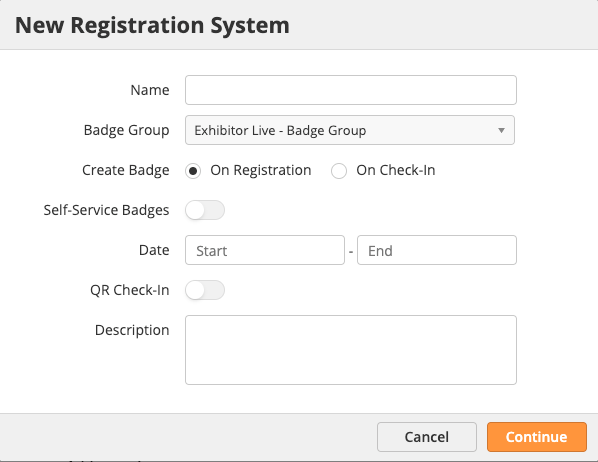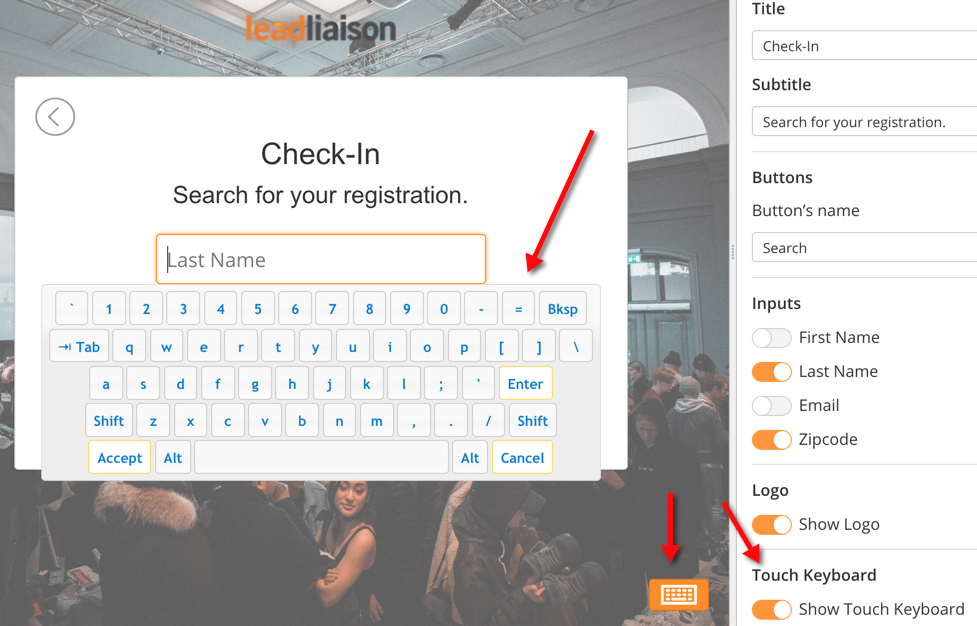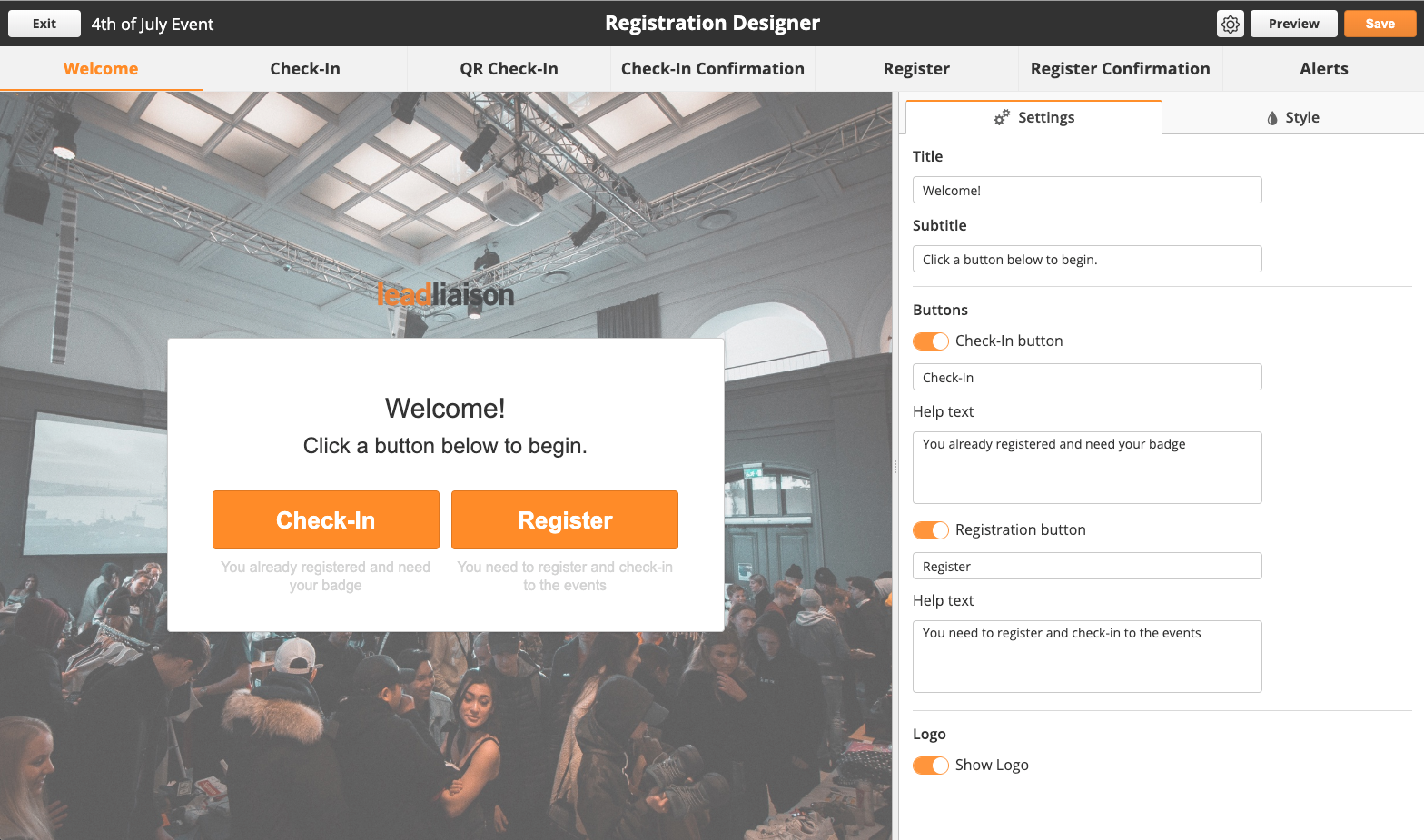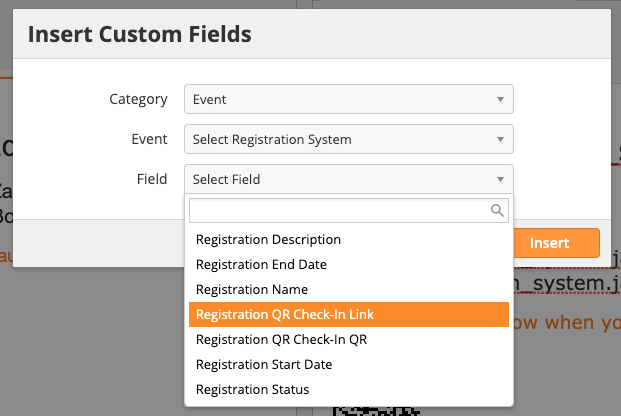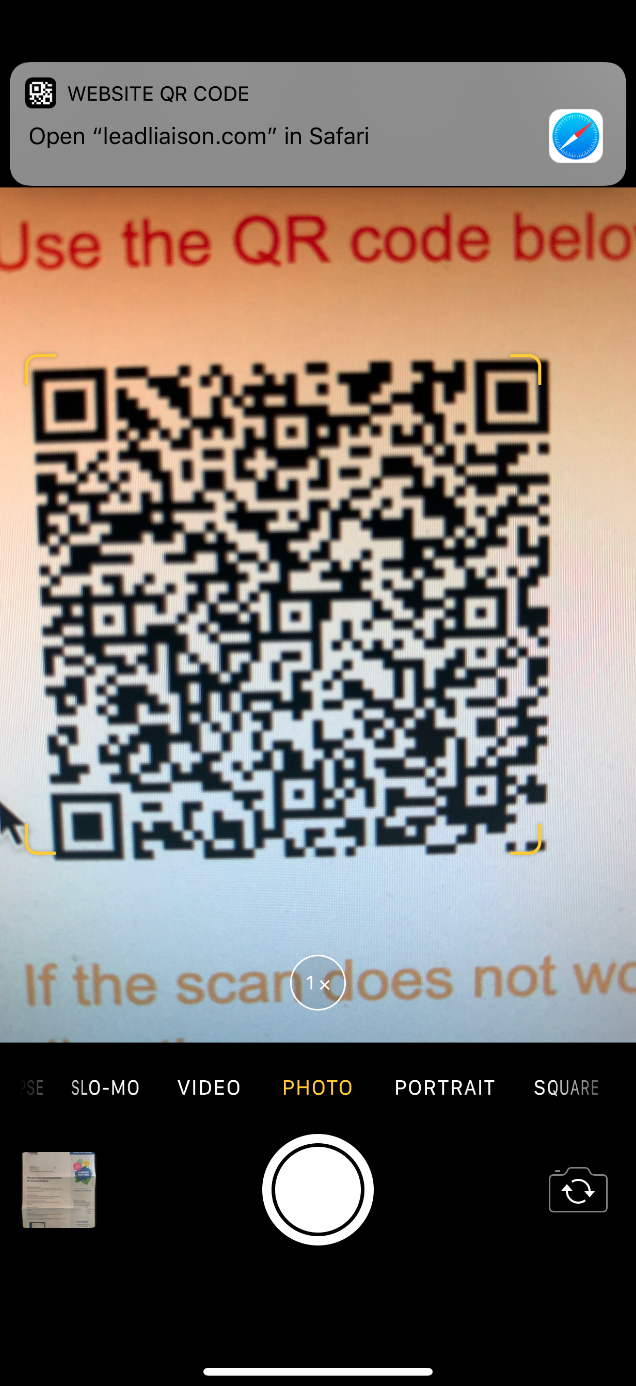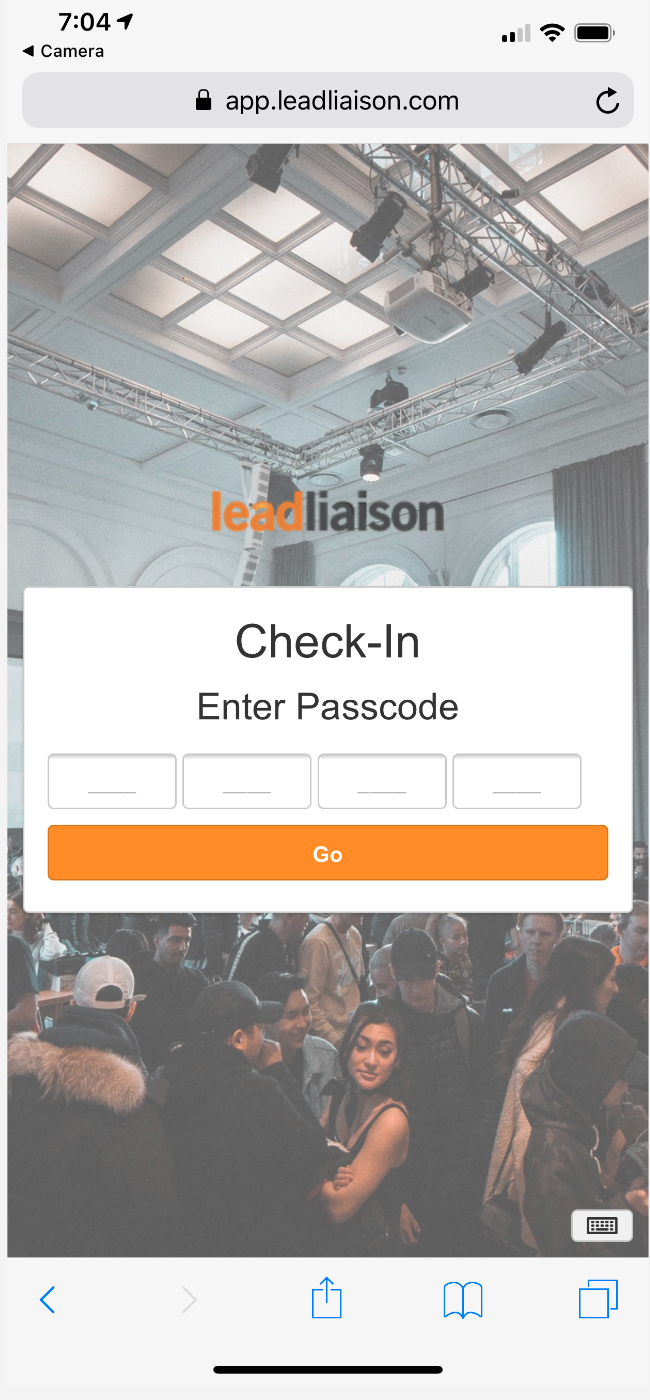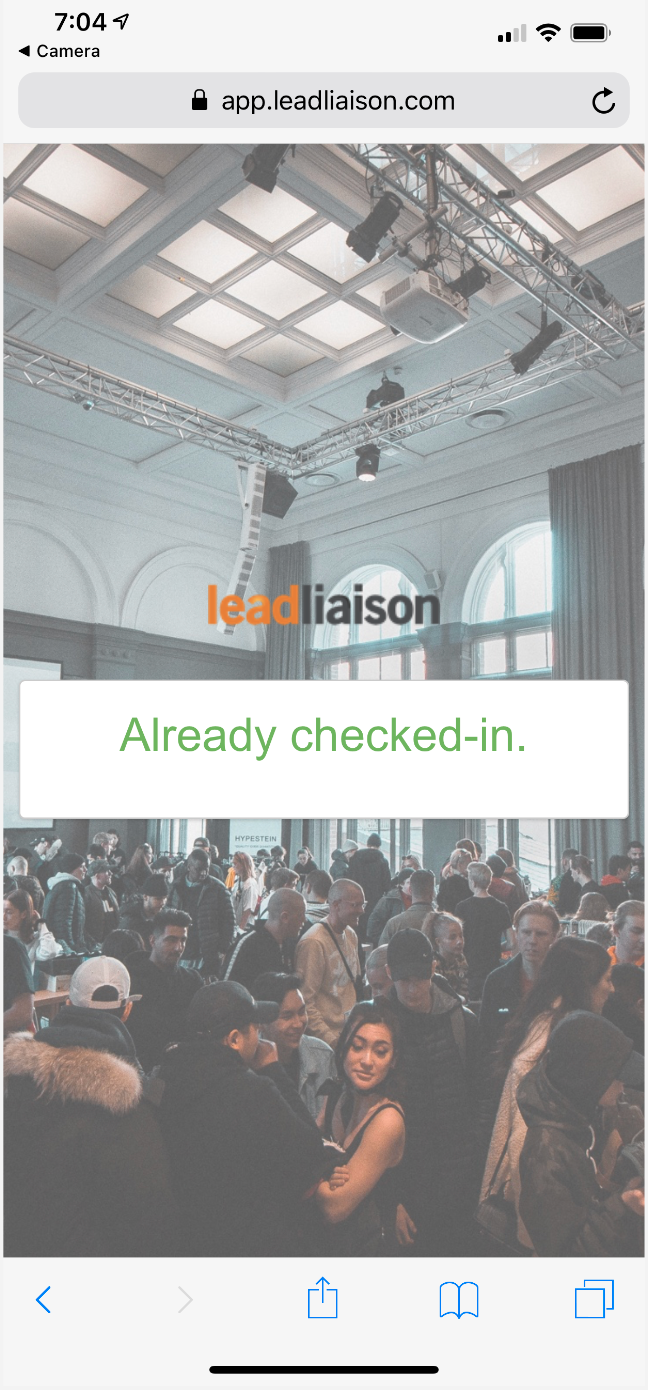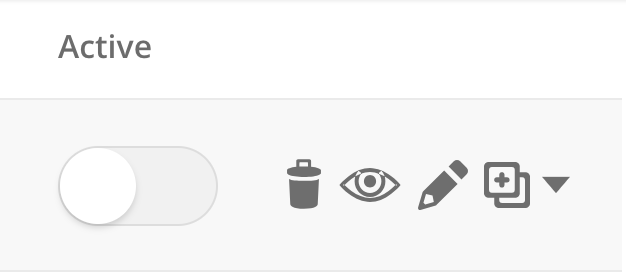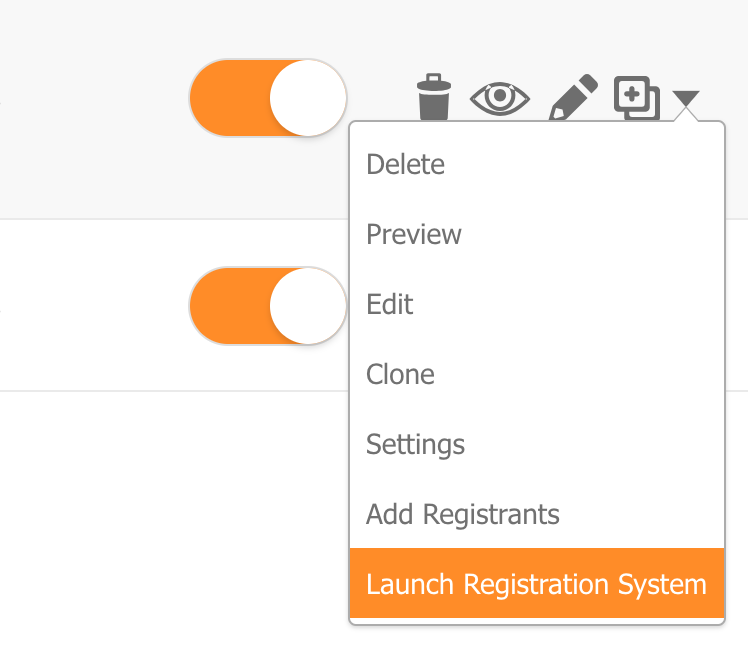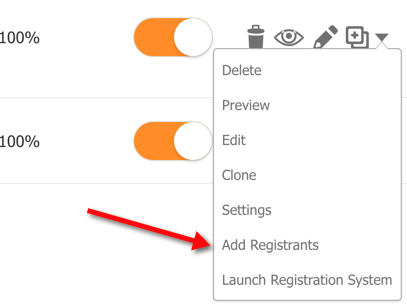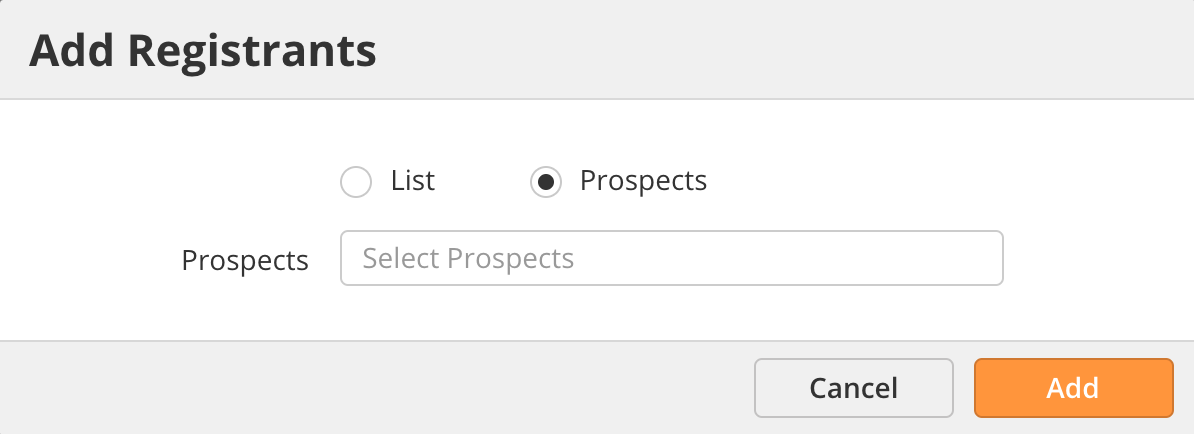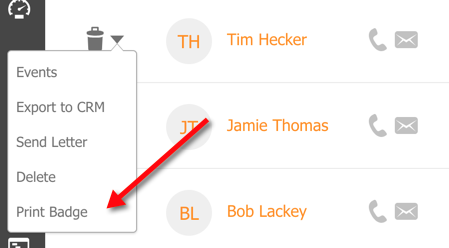Hosted Events
Overview
We provide a check-in and registration system for clients hosting their own event. This feature provides a customizable check-in and registration portal and works seamlessly with Lead Liaison Badges.
Before Your Event
Follow these helpful steps to prepare for your event.
Stay Organized
Pre-Registering Attendees
Consider creating a microsite and form to register people before your event starts.
Create a Check-In and Registration System (Portal)
To create your check-in and registration system do the following:
- Navigate to Events > Hosted > Registrations.
- Click the New button to create a new Registration System.
- Name: Name of your Registration System. We suggest using the name of your event.
- Badge Group: The Badge Group you're using that is associated with your event. To learn more about Badge Groups reference this document. This is where admins will go to print new badges on demand (if badges were not printed/prepared prior to the event or for new registrants at the front door).
- Create Badge: Option to add new people to your Badge Group when they register or when they check-in. Default is on registration.
- Self-Service Badges: Allows attendees to print their own badge after Registration or Check-In (according to your settings). This feature works with laptops or desktop computers running Windows or Mac connected to a supported Dymo printer. It does not work with iPads or Android tablets.
- Date: Start and end date of your event. If check-in occurs outside of this timeframe the system will show an error on check-in.
- QR Check-In: Allows attendees to be checked in via a QR code. QR codes can be emailed to registrants. See section below on Using QR Codes for Tickets/Passes.
- Description: Description for your Registration System.
Customizing the Check-In and Registration System
- You'll see the Registration Designer after creating a new system. Alternatively, edit your existing system by navigating to navigate to Events > Hosted > Registrations and choosing edit next to the system you want to modify.
- In the Registration Designer you have multiple tabs. Each tab is explained below:
- Welcome: Screen that users will see when they arrive at your event. This is where they would choose to Check-In or Register. You can disable either of these options to only have a single option at your event.
- Check-In: Screen users will use to search for their registration and check-in. Control how users search by using the Inputs section on this tab.
- QR Check-In: Screen to configure check-in via QR codes. Attendees can be emailed a QR code as a pass/ticket, bring the pass/ticket to the event, and check in. An initial Passcode is used by representatives before their device can be used to scan QR codes and check in registrants using this method.
- Check-In Confirmation: Screen users will see once their registration is found.
- Register: Screen users will see when they are registering for your event. Control how users search by using the Inputs section on this tab.
- Register Confirmation: Screen users see after they have successfully registered.
- Alerts: Screen users will see when a registration cannot be found on check-in, if people are already checked-in, or if people are already registered.
- Areas of the system that have input fields have an option for a virtual keyboard. If you're running your registrations and check-ins using a touch screen and don't want to hook up a keyboard, this is a good option. Users can click the small icon on the bottom right to invoke the keyboard. The virtual keyboard can also be disabled by admins in the designer by using the "Touch Keyboard" option as shown in the screenshot below.
Pro Tips
- On the Style tab of each section in the designer there's an option to "Use this style for all pages". Enabling this option will keep your customization consistent across the entire registration and/or check-in experience. Alternatively, you can make each page customized.
- Consider using customizations to monetize your event. Find sponsors to place ads or logos on the check-in registration system.
Using QR Codes for Tickets/Passes
When someone registers for an event the system can send out a pass/ticket via email that includes a QR code. The attendee can bring the QR code with them to the event to have a representative scan and check them in.
There are several merge fields available in the email builder. The screenshot below highlights some of these fields, including a merge field to insert a QR code symbol.
Once an attendee arrives, do the following:
- Use your device's native camera to scan the QR code.
- Open the link that appears.
- If this is the first time your device is being used to check someone in at the event enter the passcode provided by your Administrator. The passcode will only need to be entered once.
- A confirmation message will appear.
| 2. Enter Code (Once) | 3. Confirmation |
|---|---|---|
Publishing your Check-In and Registration System
After customizing your check-in and registration system make sure to Save it. You can also preview it using the Preview button in the designer. Once it's ready to go, publish your system by doing the following:
- Navigate to Events > Hosted > Registrations
- Activate your system by toggling the switch under the "Active" column as shown below:
- To show your system to users at the front door, hover over your registration system and click the Launch Registration System menu option.
Uploading Registrants
Communicating Before Your Event
Pre-Printing Badges
During Your Event
In the tutorial video below we discuss:
- Registering attendees on-site (existing or new).
- Checking in attendees on-site.
- Self-service badge printing.
- Allowing partners/exhibitors to scan badges.
Manually Adding New Registrants
Admins can manually add new registrants to your event. Use this option if you have a pre-registration list or if you do not want attendees registering themselves. To manually add a new registrant:
- Navigate to Events > Hosted > Registrations
- Hover over your registration system and select Add Registrants from the menu.
- In the Add Registrants modal window, select how you'd like to add new Registrants. You can add them from an existing Lead Liaison List or from an existing Prospect.
- To create a new Prospect navigate to Prospects > All Prospects and click the New button. Alternatively, if you have an orange asterisk on the bottom right side of your screen you can use this shortcut to create a new Prospect.
Manual Status Changes
Manually change the status of Prospects by clicking on the number in the event's Registrants column. Use the drop-down menu to the left of the Prospect and select Change Status.
Printing New Badges
Admins can print new badges for people that register at the event or for prior registrants if a badge was not pre-printed. We suggest having an operating a computer hooked up to your badge printer. To make this process run smoothly, do the following:
- Have the operator navigate to Events > Hosted > Badges and click on the number under the Prospects column.
- Keep this page open during the event.
- Depending on your settings, when a new person registers for your event (or if you manually add them) they will appear on this page, at the top.
- Refresh your page to see new registrants.
- When you're ready to print the badge choose Print Badge which will open the Avery system for printing.
After Your Event
In the tutorial video below we discuss:
- Analyzing attendance.
- Creating surveys and analyzing responses.
- Follow up.
Registration Statistics
Lead Liaison keeps track of registrants and attendees, along with attendance. To view your statistics navigate to Events > Hosted > Registrations. In this view you'll see:
- Registrants: Number of people that registered for your event. The total number is the number of people that registered or were manually added using the "Add Registrants" option.
- Attendees: Number of people that attended. These are also the people who have checked-in and/or registered (if you chose the option to also check them in when they register).
- Attendance: Number of attendees divided by the number of registrants.
- Rejected: Attendees that were rejected by show Admins.
- No Show: Attendees who registered but did not check in.
Click on the numbers in these columns to view or take action on these Prospects. If there is no number, no Prospects fit that category.
Badge Printing Setup
Follow these guidelines to purchase equipment for your event.
Definitions
- Attendee Kiosk(s): These are work stations at the show entrance that attendees should use to sign-in or register. Once an attendee signs-in, they should obtain their badge from the Administrator. There could be one or more Attendee Kiosks used for your event.
- Administrator(s): Person with a workstation near the Attendee Kiosk(s). This person is responsible for handing out show materials, handing out badges, or printing badges "on the fly" if they were not already printed prior to the event.
Equipment
- Attendee Kiosk(s): Lead Liaison's check-in and registration system runs in a web browser. Supported browsers are Google Chrome and Firefox. We recommend having a keyboard connected to the kiosk; however, Lead Liaison does have a virtual keyboard to support touch screen monitors. You can also use a laptop for the Attendee Kiosk. Any computer with a keyboard or computer with a touchscreen that can run a web browser is supported.
- Administrator(s): Administrators that need to print badges on the fly will require a computer that can run a web browser (Chrome/Firefox) connected to a printer. Badges are created from Lead Liaison's web application and printed in Avery's software. Any inkjet printer may be used with the preferred Avery template loaded into the printer to print a badge. Badges can also be printed using a Dymo printer.
Badges
- Using any printer: This video explains how to search for and purchase your badge templates, holders, and clips/lanyards. Avery 74461 (clip style) and Avery 74459 (hanging style) are both good options.
- Using Dymo printers: Lead Liaison also supports on-the-fly and bulk badge printing using Dymo printers. Any of the Dymo 450 printers will work, or the wireless printer called the Dymo LabelWriter Wireless Printer. We suggest the Dymo 450 Turbo. You can compare Dymo 450 printers here. Dymo printers are extremely fast, printing 71 labels per minute, and great for single badges or printing in bulk. For labels with a Dymo printer, we suggest the 30856 labels, which are non-adhesive.
Equipment Checklist
Attendee Kiosk(s)
| Type | Purpose | Equipment |
|---|---|---|
| Attendee Kiosk Station | Run browser for check-in or registration | Any computer capable of running Google Chrome or Firefox. Could be an all-in-one, workstation, or a tablet. |
| Attendee Kiosk Monitor | Display check-in/registration to attendees | Touchscreen or any computer monitor connected to computer. If using a tablet then a monitor is not needed. |
| Attendee Kiosk Keyboard | Allow attendees to fill out the check-in or registration form | Any keyboard connected to station. If using a tablet then a keyboard is not needed. |
Administrator(s)
| Type | Purpose | Equipment |
|---|---|---|
| Admin Computer | Used to select new registrants | Any computer with a monitor or a laptop. System must be able to run Google Chrome or Firefox and be connected to a printer. |
| Admin Printer (Avery) | Print badges | Any inkjet printer. |
| Badges (Avery) | Badges | See badge section above to choose badges. |
| Admin Printer (Dymo) | Print badges | Dymo 450 printer (suggest Dymo 450 Turbo). There's also a wireless version, called the Dymo LabelWriter Wireless Printer. |
| Badges (Dymo) | Badges | Dymo 30856 labels. Buy inserts and lanyards separately. |
Related content
© 2021 Lead Liaison, LLC. All rights reserved.
13101 Preston Road Ste 110 – 159 Dallas, TX 75240 | T 888.895.3237 | F 630.566.8107 www.leadliaison.com | Privacy Policy
